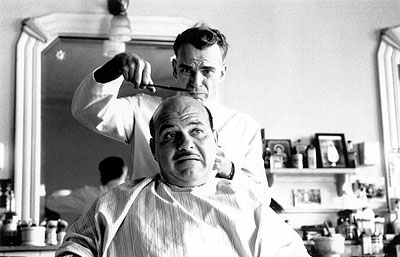A small town noir set in 1949, a monosyllabic protagonist with a cigarette a permanent fixture, and monochrome film (that's black & white to you and I). This is really quite a downer of a movie. It's also about ten minutes too long which is unusual for the Coens whose scripts are usually very tight.
The decision to film in black and white was a good one as this is a very colourless film. There is no joy anywhere in it, there's no happiness. The monosyllabic protagonist barber Ed Crane (Billy Bob Thornton), who also narrates, is trapped in an uncommunicative marriage with a wife (Frances McDormand) who is having sex with her boss (James Gandolfini), Ed decides to anonymously blackmail the boss to fund a business deal with Jon Polito a travelling man who wants to start a chain of dry cleaners (dry cleaning being a new invention at the time). And, as you'd expect, it all goes to shit. Gandolfini thinks Polito is the blackmailer but learns otherwise. Polito disappears with the cash. Gandolfini confronts Thornton and in the struggle is accidentally killed. McDormand is arrested for his murder and things go progressively downhill (but less interestingly).
It's possible to posit that the film is a study in alienation. Thornton's character is as alienated as it's possible to get. He has no real marriage and he works for his brother in law. This mirrored by Gandolfini whose wife (somewhat resembling the Wicked Witch of the West), usually silent, turns out to be a flying saucer nut and that a government conspiracy is behind her husband's death, and he took works for his wife's family. Apparently successful, Gandolfini is as desperate as Thornton who takes away the money that McDormand has embezzled for him to start his own store.Everyone in the film is trapped, even the talented teenage pianist (Scarlett Johansson) who's more interested in boys than her gift -she plays technically well but without any spark, which could stand as metaphor for this film.
This is a bleak, overlong, and frankly depressing film which seems to lack energy and saps that of the viewer. It's well made of course, it couldn't be anything else. On a technical level it's even brilliant. It just isn't a film which can really be enjoyed.*
Random Notes.
* I could be in a minority here as it seems to have gone down very well at the box office as well as with critics, so don't let me put you off.
As usual for a Coen Brothers film, it was nominated for awards all over the place and won many of them, most notably for the cinematography by Roger Deakins.
Unsurprisingly, noir crime writer James M. Cain was mentioned as a significant influence on the film.
There will be two more days of Joel & Ethan Coen - Oh Brother, Where Art Thou? is to come, and an overview to conclude matters. But I'm taking a break for a few days from them to watch a couple of Asian movies and The Girl Who Played With Fire and also read a book I've just ordered about them.



No comments:
Post a Comment